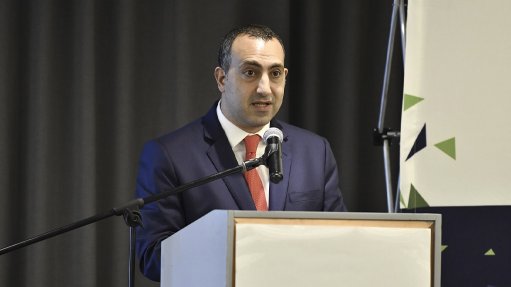
GMIS organising committee MD Namir Hourani
Photo by: Creamer Media's Dylan Slater
Global Manufacturing and Industrialisation Summit (GMIS) organising committee MD Namir Hourani says that Fourth Industrial Revolution (4IR) technology is playing a key role in advancing the manufacturing sector and driving prosperity on a global level.
Speaking to Engineering News Online on the sidelines of GMIS Connect Southern Africa, in Pretoria, on Tuesday, he explained that manufacturing – which employs more than 500 million people worldwide and is one of the largest contributors to global gross domestic product – is regarded as an important driver of economic development and will be vital to generating new jobs for millions of people.
There is no economy in the world that has reached an advanced level of prosperity without an advanced industrial sector, he stated.
During Hourani’s keynote presentation on Tuesday morning, he told delegates that
a platform like GMIS was essential to allow all stakeholders to come together to address the various opportunities and challenges posed by the disruptive impact the 4IR is having on manufacturing. This, in turn, is influencing government policies and strategies around the world.
He told Engineering News Online that, as a driver of change, the sector could help to tackle poverty and crime levels through job creation. In South Africa the manufacturing sector could ultimately “make the economy prosper”.
However, coupled with the massive opportunities brought about by advanced manufacturing, Hourani acknowledged that the sector faces a new set of challenges within the 4IR context – included some job losses, the need to retrain workers with new skills and policy changes.
He added that while the 4IR has resulted in greater interconnectedness and ease of doing business, this connectivity offers a “playground” for digital threats, such as hackers, that would need to be addressed.
If your manufacturing plant network is not secure, the system can potentially be hacked, he stated.
“Cybersecurity is a risk and how to mitigate this is challenging, but it’s also about security and collaboration between government and the private sector,” he pointed out, adding that start-up companies were usually big drivers of security.
When it comes to digital technology, Hourani proposed that start-ups be consulted in the process to mitigate against cyber threats.
“There isn’t a single solution, but companies should be investing in cybersecurity if they want an interconnected platform and organisation,” he told Engineering News Online.
Further, while it was easy to cite economic prosperity as a measure of success, Hourani emphasised that it took time before the economic value and benefits of new technologies were fully realised and the initial investment paid off.
“There is a lot of work and preparation that needs to take place, which in some cases takes years,” he said, suggesting that patience might just be the key to realising a country’s economic prosperity.